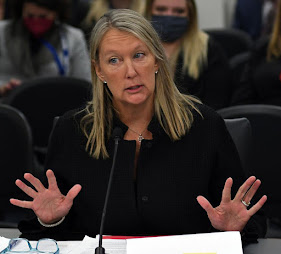Legislature sends Beshear a bill to ban any ‘zero visitor’ policies in nursing homes other facilities, a legacy of the pandemic

State Sen. Julie Raque Adams (Legislative photo)
—–
By Melissa Patrick
Kentucky Health News
A bill to guarantee an essential caregiver’s right visit a resident at long-term care facilities, assisted-living communities and state-owned mental health hospitals has passed unanimously through both chambers of the General Assembly and awaits Gov. Andy Beshear’s signature.
Senate Bill 100, sponsored by Sen. Julie Raque Adams, R-Louisville, establishes that the caregiver can be either a family member, legal guardian, outside caregiver, friend or volunteer who is important to the mental, physical or social well-being of the resident.
“This will put in statute and codify their ability to visit their loved one in any of these facilities,” Adams told the House Health & Welfare Committee Thursday, Jan. 27.
The committee chair, Rep. Kim Moser, R-Taylor Mill, described the bill this way: “The gist of this is that there will never be zero visitors allowed.”
SB 100 is modeled after provisions that were included in bills passed in regular and special sessions last year. Those provisions are set to expire on Jan. 31, so Adams’ bill was put on a fast track to passage.
While presenting the bill to the House committee, Adams said changes in the House the committee substitute would allow more than one caregiver to visit a loved one, clarify that a facility can allow the caregiver to visit their loved one in their room rather than a designated location if there is a need, and allow the facility to limit the total number of caregivers allowed to visit at one time.
Sherry Culp, the state’s long-term care ombudsman, told the panel that while about 60% of long-term care residents don’t have visitors, the visitation ban imposed early in the pandemic had a “devastating effect” on the 40% who do, many of whom not only relied on caregivers for social and emotional support, but for personal care.
“We hope that we never again see all visitors banned from visiting . . . residents in long term care facilities because we’re concerned about an unnecessary decline and we are so grateful for Senator Adams for recognizing these devastating effects of visitation bans,” Culp said.
Marla Carter of Owensboro told the lawmakers by remote video about the devastating impacts the lockdown had on her mother-in-law, Linda, who lives in a nursing home. Carter and her husband are her co-guardians: “The lock-downs and isolation have definitely had a very detrimental effect on Linda.”
When the visitation ban was relaxed to allow weekly 15-minute outdoor visits, with participants six feet apart, her mother-in-law found that confusing, and that no matter the explanation, “She really thought that we were abandoning her,” Carter said, adding that when outside visits were stopped because of last fall’s surge in cases, Linda’s condition rapidly declined.
“So when we last saw her in November of 2020, she was talking, playing Jeopardy, painting craft projects and then when we saw her in January 2021, just two months later, she was completely nonverbal, barely alert or aware of her surroundings,” she said. “And yet when we would call to speak to the staff and inquire about her condition, they told us she was fine. She obviously was not.”
Carter said nursing homes are doing the best that they can amid chronic staffing shortages, and must keeping clients safe, but also noted the valuable role that family members play as ‘staff extenders” who not only provide personal care, but also provide social and spiritual support to their loved ones.
“Family members are direct care partners,” she said. “No one knows our loved ones like we do. No one cares for our loved ones as much as we do. We provide their connection to their memories, to their sense of self and well-being.”
Sen. John Schickel, R-Union, told the Senate that this bill was one of the most important pieces of legislation to pass this session.